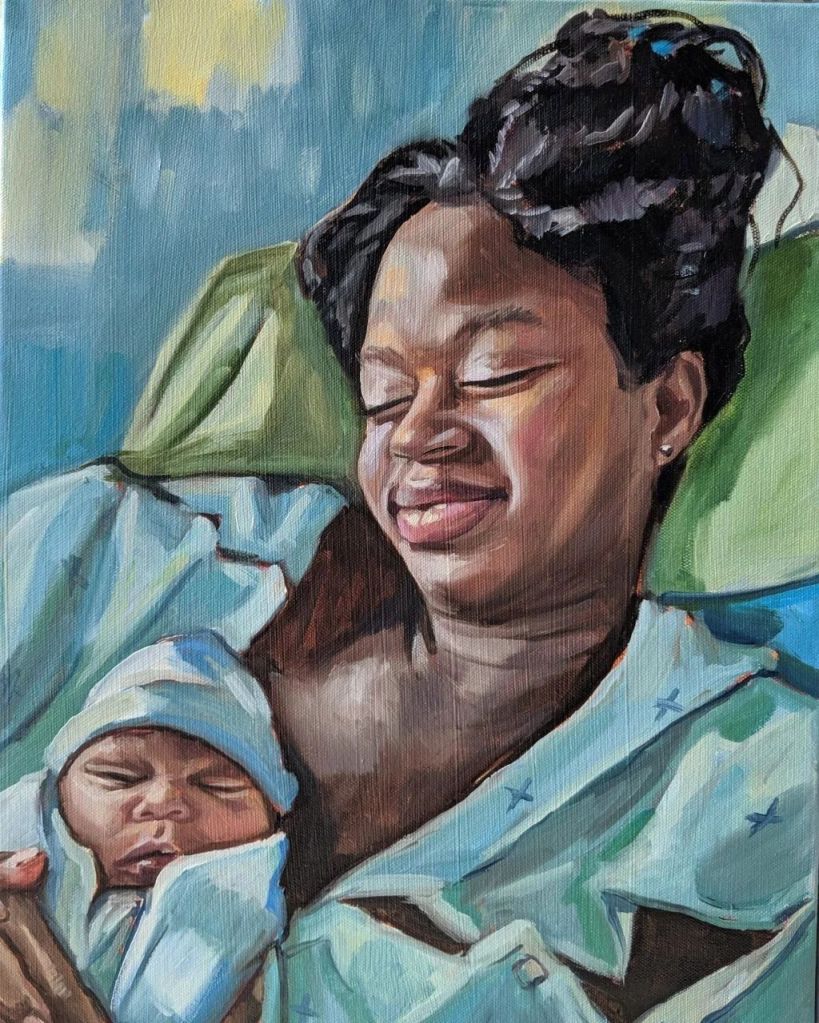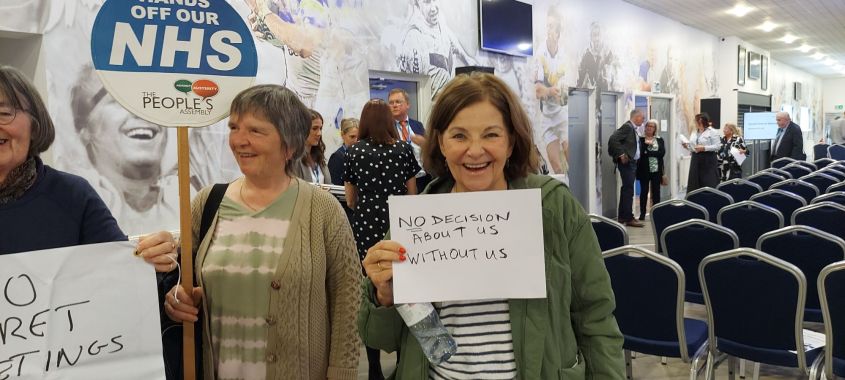This blog post comes from a speech at a meeting held at the Quaker Meeting House Liverpool on Monday 11th March, 2024, for International Women’s Day. Other speeches were about child poverty, NHS privatisation, the situation in the big hospitals in Liverpool, and the situation for Hospitals in Gaza. We will publish those speeches too.
Mrs Pankhurst ended a famous meeting with the words “I incite this meeting to Rebellion!”. We follow in the footsteps of campaigning women over the years as we fight for maternity care, for the NHS, for women’s rights and against poverty.
We are campaigning for safe, respectful healthcare and maternity care for all women and babies. Giving birth can be a truly wonderful experience.

“We meet here in Liverpool to mark International Working Women’s Day 2024. We meet to salute the women who have fought and won much in the past, to send sisterly greetings to all women around the world especially to those in struggle, those in war, and those damaged by the climate crises.
I want to talk about women’s health and maternity, locally, nationally and internationally. No one is safe until we all are safe. Change is possible. In living memory, we have seen huge improvements nationally and globally. In more recent memory we have seen significant damage done to these services again both nationally and globally, but the damage is most severe where government policies of Austerity or “Restructuring” have been imposed. Restructuring is what Austerity is called in the Global South when countries are forced by the IMF to cut services because economic problems drive them to turn to it for aid.
“Between 2014-18 resources spent on public services dropped by more than 18 per cent in Latin America and the Caribbean, and by 15 per cent in Sub-Saharan Africa. Looking ahead, the International Monetary Fund (IMF) predicts that this trend will continue in all regions.”
It is always the women who carry the weight of such cuts and this is reflected in maternal deaths and infant mortality. Sadly, for the UK, we have experienced some of the worst damage amongst the richest countries. But as Governments imposed that damage, governments could repair and restore that damage. Meanwhile, it is our babies, our women who pay the price.
I will look in a minute at the most damning figures, those showing the deaths of mothers and of babies. We mark these deaths with respect and will both mourn and organise to improve this situation.
Our World in Data says “For most of human history, around 1 in 2 newborns died before reaching the age of fifteen. By 1950, that figure had declined to around one-quarter globally. By 2020, it had fallen to 4%. But while humanity has made much progress, there is still a lot of work to do.”
Look at the figures for infant mortality at birth. Twenty-seven other countries have better figures than ours, yet ours is one of the richest countries globally.
“The UK is fifth from the bottom among 27 European countries for infant mortality. The rate stalled in the UK between 2013 and 2018 at 3.9 per one thousand live births. In England and Wales, the rate is more than twice as high in the most deprived areas (5 per one thousand) compared with the least deprived areas (2.7 per one thousand).” (4 Mar 2020)
The latest figures from MBRRACE-UK (who report on maternal and baby deaths in the UK over time) show that the number of women dying in the UK during or soon after pregnancy has increased to levels not seen since 2003-05.
In 2020-22 there were 13.41 deaths in every 100 000 maternities, significantly higher than the maternal death rate of 8.79 deaths per 100 000 in 2017-19 and similar to 2003-05 (13.95 per 100 000).
We stop for a minute to mourn the death of two African women at Liverpool Women’s Hospital.
We do not accept the term “cultural bias.” It is racism and it must end. We recognise the increased risk for Black and Asian women in the maternity services as they are working today. We mourn these sisters and we will fight on to repair these terrible damages. We will be difficult to the government and to the NHS bosses in their names.
Internationally
Globally, every day in 2020, approximately eight hundred women died from preventable causes related to pregnancy and childbirth – meaning that a woman dies around every two minutes.
South Sudan had 1223 deaths per 100,000 women giving birth.
Belarus has 1.1 deaths per 100,000 women giving birth.
The UK has 13.41 deaths in every 100,000 women giving birth.
“In 2020-22 there were 13.41 deaths in every 100,000 maternities, significantly higher than the maternal death rate of 8.79 deaths per 100,000 in 2017-19 and similar to 2003-05 (13.95 per 100,000).”
Statistics released by MBRRACE-UK show that the maternal death rate in the UK has increased significantly over the past few years. Between January 2020 and December 2022, the rate was 13.41 per 100,000 maternities, up 53% from 8.79 per 100,000 in the previous three-year period from 2017-2019. This rate is the highest it has been in almost 20 years.
This is worse than Albania and Turkmenistan, yet this country has one of the largest economies in the world, and we used to have the best healthcare system in the world. The UK is fifth from the bottom among 27 European Countries for infant mortality
The situation is so serious that parents of babies who died or who were injured in maternity care are demanding a public enquiry. There have been many detailed and authoritative reports, often commissioned by the Government or by Parliament, on maternity services, but the government response has been appalling.
Maternity safety matters; building national links.
We are working with other campaigns including Keep our NHS Public with whom we have produced this fact sheet. We would be delighted to hear from other campaigns with whom we have not yet made contact.
We say that this government does not care about maternity deaths, does not care about the poor experience of giving birth, that poor funding and poor staffing numbers inflict on women. The government does not care about, indeed prides itself, on women’s poverty. Let me emphasise that. This is not governmental ignorance. The government are not ignorant of the damage they have done and are doing. It is a conscious choice. The Government have all the reports, they commissioned some of the reports, they have the evidence and they choose not to act to ameliorate the situation. It prefers to serve the very rich. It would rather pay damages for babies damaged at birth than sort the situation out. The cost of compensating mothers and their families for harm caused by NHS maternity services is more than double what the health service spends on such care each year, analysis shows.
This situation is manageable, and it could be changed. Money invested in patient care and staffing leads to a richer economy, not a poorer economy.
Change is possible and change is necessary.
While we mourn our dead, it is also important to consider the lesser injuries, and the other bad experiences women and babies are enduring because of the state of the service and because of poverty inflicted by Austerity. These damages are real and important whether we are talking of physical or mental injury. This situation could be repaired. Neither deaths nor lesser injuries are inevitable.
Save Liverpool Women’s Hospital Camapign is far from alone in calling out the damage being done. There are a host of charities and the Royal College of Midwives making the same point.
Birte Harlev-Lam, Executive Director, Midwife at the RCM said: “Women and their safety are still not being put at the centre of care. If this were the case, we would see significant amounts of additional funding and real efforts to support, retain and recruit staff, and we are not. There is a black hole in the centre of our maternity services where more money and staff should be. I have no doubt this is undermining maternity staff efforts to deliver the safest and best possible care for women and their babies.
Some avoidable maternal deaths and maternal injuries are due to NHS understaffing, under equipment and understaffing. There is another factor in these deaths. The extreme inequality in the UK, and the cruel impact of austerity on women and on women’s health, on children and on children’s health arising from government policies and priorities, also affect maternal and infant mortality. Poverty causes extreme stress, poor nutrition, poor housing and poor health. Poor mental health after birth leads to deaths, especially amongst the poor, and Black women, yet maternal mental health services are badly damaged, and health visitor numbers have not recovered from the pandemic.
The impact on staff wellbeing, on workload and staff retention is also important. Working under constant pressure is extremely damaging to the health of staff. Neither giving birth, nor having treatment for Gynaecological issues, is routine or ordinary. It is staff vigilance that leads to safety. How someone can be vigilant at the end of a very busy 13-hour shift is beyond me. Many people working in the NHS do not feel free to speak out, and those running the show, plod on making the cuts or CIPS without informing the public of the damage being done, nor describing the damage done in earlier years of austerity.
“This is all having an impact on the safety and quality of care for women and also means many women with more complex needs such as mental health problems are not getting the care they need and deserve. This is also leaving staff exhausted, overwhelmed, fragile and feeling massively undervalued” warns the Royal College of Midwives.
Maternity is underfunded and hospitals are not even spending what the government allocate to maternity (according to the RCN) because they can’t balance their books without using that money for other things.
There is an ongoing shortage of midwives. The BBC reports a shortage of about 2,500 midwives on the ratios that the Government describes as safe for maternity care. We would say that these Government figures for provision of midwives are themselves too low for what is required. So, 2,500 is the minimum extra required.

Our struggle is part of the campaign to restore the NHS, to renationalise it, to turn it once again into a publicly delivered, comprehensive, national service, to make it safer for women and babies. Our campaign is part of the campaign for safety in maternity, part of the campaign for better pay and conditions for staff. It is also part of the campaign for women’s rights, and intrinsic to the rights of women are the rights of the child.
Inequality and poverty affect women’s health and the health of their children.

There are fourteen million children (aged up to 18) in the UK. Reports this week drew out the terrible extent of childhood poverty in the UK. Meghan Meek-O’Connor, senior child poverty policy adviser at Save the Children UK, said: “Today 4.3 million children are being failed. It is an outrage that 100,000 more children are in poverty – they are being forgotten.
Britain in the 1970s was one of the most equal of rich countries. Today, it is the second most unequal, after the US (27 Nov 2023).
Stewart Lansley, the author of The Richer, the Poorer and The Cost of Inequality, said it was “an acute paradox of contemporary capitalism that as societies get more prosperous, rising numbers are unable to afford the most basic of material and social needs.” He also said: “In Britain, child poverty has doubled in 40 years. Yet few modern tycoons go without private jets, luxury yachts, even private islands.”
In a meeting in Liverpool recently it was reported that;
“Inequality has no more powerful expression than in children’s health, and children in our region get a particularly bad deal,” before pointing out that Liverpool’s infant mortality rate remains above the national average and that, every year, around twenty-six infants in the city do not reach their first birthday.
They reveal how poor health in mothers of the next generation can lead to ingrained health inequalities, adding: “Babies born small or early because of poor maternal health have the worst possible start to life and a health trajectory which culminates in a shorter life expectancy and more years lived in ill health.”
For those babies who survive, there is an uncertain future ahead with current trends predicting that by 2040, Liverpudlians will live more than a quarter of their lives in ill health.”

Our campaign will fight on about this as well as fighting for the restoration of the NHS.
Poverty amongst women.
“Women living on low incomes in England are at increased risk of experiencing poor health during pregnancy. Our recent review of the evidence found that women and babies living with socioeconomic disadvantages had a 40% increased risk of worse pregnancy outcomes including stillbirth, low birth weight and babies being born early. Women may also experience mental health issues following pregnancy, birth or in the first year after birth. Women with lower access to financial, educational, social and health resources engage less in care during pregnancy – called antenatal or maternity care.”


Save Liverpool Women’s Hospital Campaign started in 2015 to try to stop the closure of Liverpool Women’s Hospital. The assault on the NHS and on working class living standards was well under way by 2015 and closing one more hospital was small beer to the bureaucrats of the NHS and our city council at the time. We had already seen the scandal of Prince’s Park Medical Centre (See this article or this book for the history) and the fight to stop PFI in this city, so we were able to mobilise for Liverpool Women’s Hospital and to build our petition and awareness in the city.

Liverpool Women’s Hospital is still here, still short of money and staff, and still threatened with merger, dispersal, and de facto closure. We will publish a more detailed report on the situation for Liverpool Women’s Hospital shortly.
We saw enormous improvements in infant mortality and maternal mortality following the introduction of the NHS. We can see such improvements once again if the NHS is reinstated.
So, we will persist, as women do.

We send special greetings to the Home Based Women Workers’ Trade Union of Pakistan with whom we have exchanged greetings each year of our campaign. They have built a powerful trade union amongst women who work at home in various trades. They inspire us to continue in our campaign. We send greetings to the women working to unionise the uranium mines in Namibia. We send greetings to women around the world fighting for better maternity care.

As always we look to how women in the past have won gains in rights and services, we remember the women who fought for the vote, the women who fought for baby clinics and maternity care and contraception here in Liverpool, the women of the sixties and seventies who fought for women’s rights in childbirth, for those who fought for women to be able to choose contraception without their husbands permission, for abortion rights, for equal pay, with a special shout out to the machinists in Fords In Speke, for women’s economic independence, for the end to the marriage bar in teaching and other jobs for the fight for the Women’s Hospital in London and many more
We campaign, we organise, we agitate, we consult, we build links, we challenge and we demand. We can win but only as we grow ever bigger.

Save Liverpool Women’s Hospital for all our mothers, sisters, daughters, friends, and lovers and for every baby.
Please support our campaign Please sign our petition ( unless you have already signed)





















